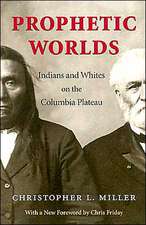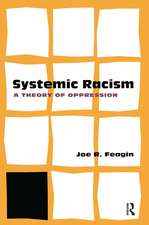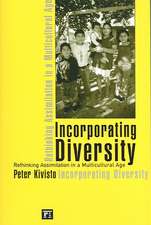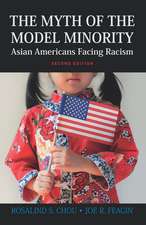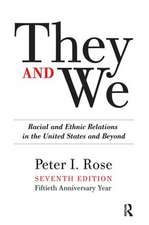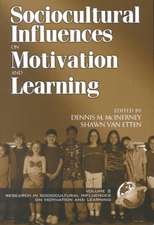Liberation Sociology
Autor Joe R. Feagin, Hernan Vera, Kimberly Duceyen Limba Engleză Paperback – 30 aug 2014
| Toate formatele și edițiile | Preț | Express |
|---|---|---|
| Paperback (1) | 248.31 lei 6-8 săpt. | |
| Taylor & Francis – 30 aug 2014 | 248.31 lei 6-8 săpt. | |
| Hardback (1) | 1045.42 lei 6-8 săpt. | |
| Taylor & Francis – 30 aug 2014 | 1045.42 lei 6-8 săpt. |
Preț: 248.31 lei
Preț vechi: 296.80 lei
-16% Nou
Puncte Express: 372
Preț estimativ în valută:
47.51€ • 49.74$ • 39.31£
47.51€ • 49.74$ • 39.31£
Carte tipărită la comandă
Livrare economică 05-19 aprilie
Preluare comenzi: 021 569.72.76
Specificații
ISBN-13: 9781612057248
ISBN-10: 1612057241
Pagini: 356
Dimensiuni: 152 x 229 x 15 mm
Greutate: 0.5 kg
Ediția:3 Rev ed.
Editura: Taylor & Francis
Colecția Routledge
Locul publicării:Oxford, United Kingdom
ISBN-10: 1612057241
Pagini: 356
Dimensiuni: 152 x 229 x 15 mm
Greutate: 0.5 kg
Ediția:3 Rev ed.
Editura: Taylor & Francis
Colecția Routledge
Locul publicării:Oxford, United Kingdom
Cuprins
Chapter 1 What Is Liberation Sociology?; Chapter 2 Improving Human Societies; Chapter 3 US Sociology from the 1890s to the 1970s; Chapter 4 Sociology Today; Chapter 5 Sociology in Action; Chapter 6 Doing Liberation Social Science; Chapter 7 Liberation Theory and Liberating Action; Chapter 8 Sociology, Present and Future; Chapter 9 Epilogue:;
Notă biografică
Texas A&M University,
University of Florida,
University of Winnipeg
University of Florida,
University of Winnipeg
Recenzii
Praise for previous editions:
“I came away from Liberation Sociology with a sense of renewed hope for the field. . . . Until Liberation Sociology, I found few well-written, cogently presented, and well-researched arguments suitable for the next generation of sociologists. This volume addresses this lack. For every undergraduate student considering entering sociology, for every graduate student wondering about his or her choice, as well as for current sociologists who wonder whether they have lost their way, Liberation Sociology might prove to be a breath of fresh air.”
—Patricia Hill Collins in the American Journal of Sociology
“I've successfully used the first edition in theory classes, and this new edition is even better! Liberation Sociology is to sociology what Howard Zinn's People's History is to U.S. history: an exciting and important revision of 'received history' that will enliven class discussions and validate the noblest motivations for studying sociology. Very highly recommended.”
—Barbara Finlay, Texas A&M University
“Liberation Sociology is must reading.”
—Gideon Sjoberg, University of Texas–Austin
“In this unique book, Joe R. Feagin and Hernán Vera show that sociology can make a vital contribution to human freedom and well-being. Drawing on many practical contributions of sociological researchers and activists, they offer an inspiring vision of the field and its possibilities. This crucial text will be adopted in courses everywhere.”
—Howard Winant, Temple University
“Truly a magnificent, original, exciting, and powerful consciousness-raising book!”
—Bernice McNair Barnett, University of Illinois–Urbana-Champaign
“I came away from Liberation Sociology with a sense of renewed hope for the field. . . . Until Liberation Sociology, I found few well-written, cogently presented, and well-researched arguments suitable for the next generation of sociologists. This volume addresses this lack. For every undergraduate student considering entering sociology, for every graduate student wondering about his or her choice, as well as for current sociologists who wonder whether they have lost their way, Liberation Sociology might prove to be a breath of fresh air.”
—Patricia Hill Collins in the American Journal of Sociology
“I've successfully used the first edition in theory classes, and this new edition is even better! Liberation Sociology is to sociology what Howard Zinn's People's History is to U.S. history: an exciting and important revision of 'received history' that will enliven class discussions and validate the noblest motivations for studying sociology. Very highly recommended.”
—Barbara Finlay, Texas A&M University
“Liberation Sociology is must reading.”
—Gideon Sjoberg, University of Texas–Austin
“In this unique book, Joe R. Feagin and Hernán Vera show that sociology can make a vital contribution to human freedom and well-being. Drawing on many practical contributions of sociological researchers and activists, they offer an inspiring vision of the field and its possibilities. This crucial text will be adopted in courses everywhere.”
—Howard Winant, Temple University
“Truly a magnificent, original, exciting, and powerful consciousness-raising book!”
—Bernice McNair Barnett, University of Illinois–Urbana-Champaign
Descriere
Many people of all ages today continue to be attracted to sociology and other social sciences because of their promise to contribute to better political, social, and moral understandings of themselves and their social worlds-and often because they hope it will help them to build a better society

